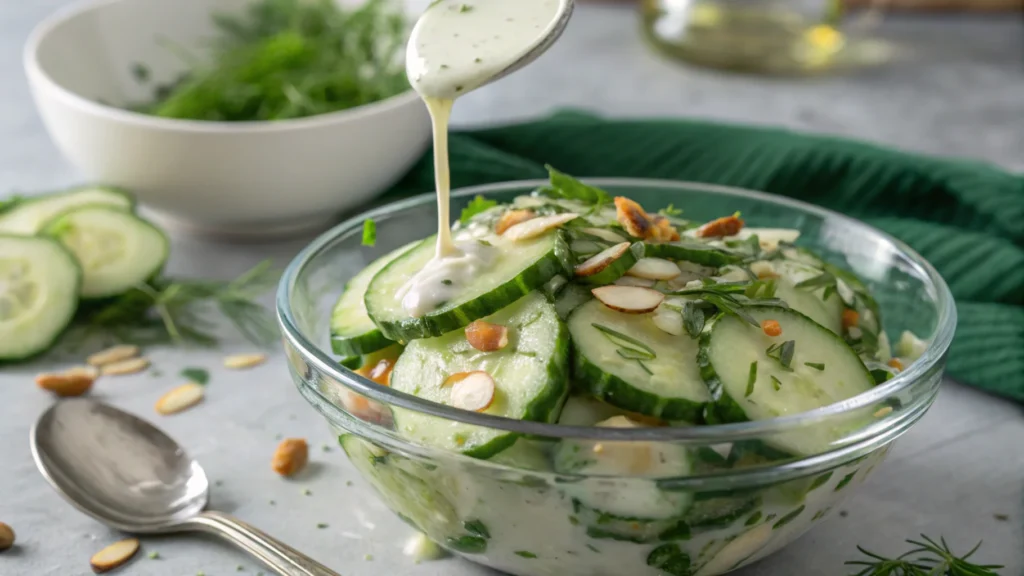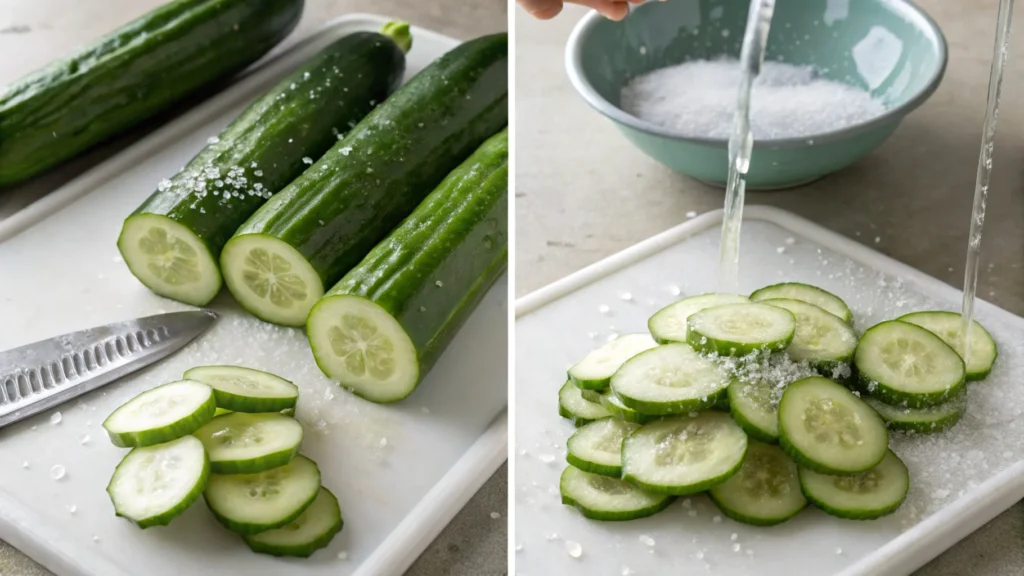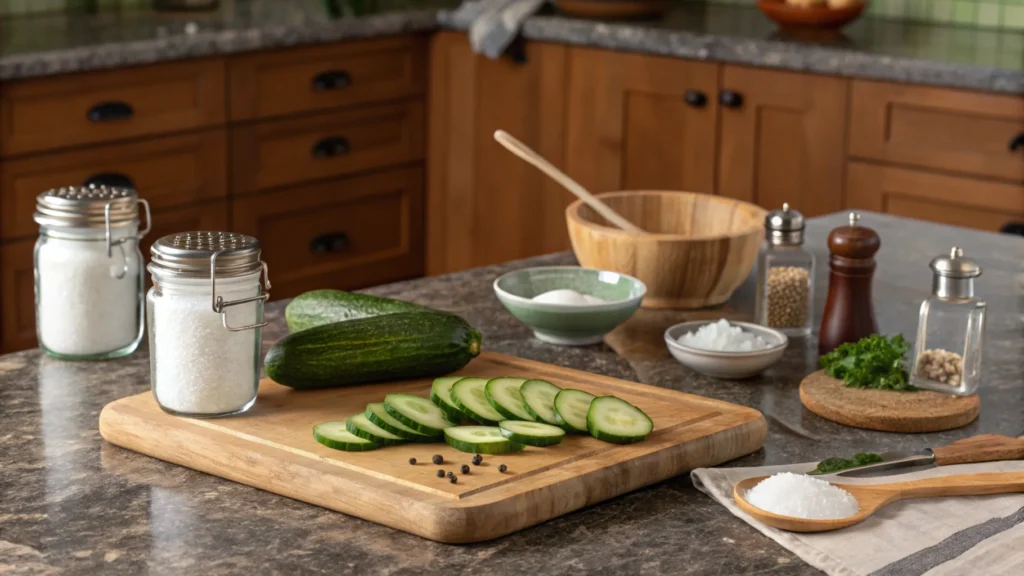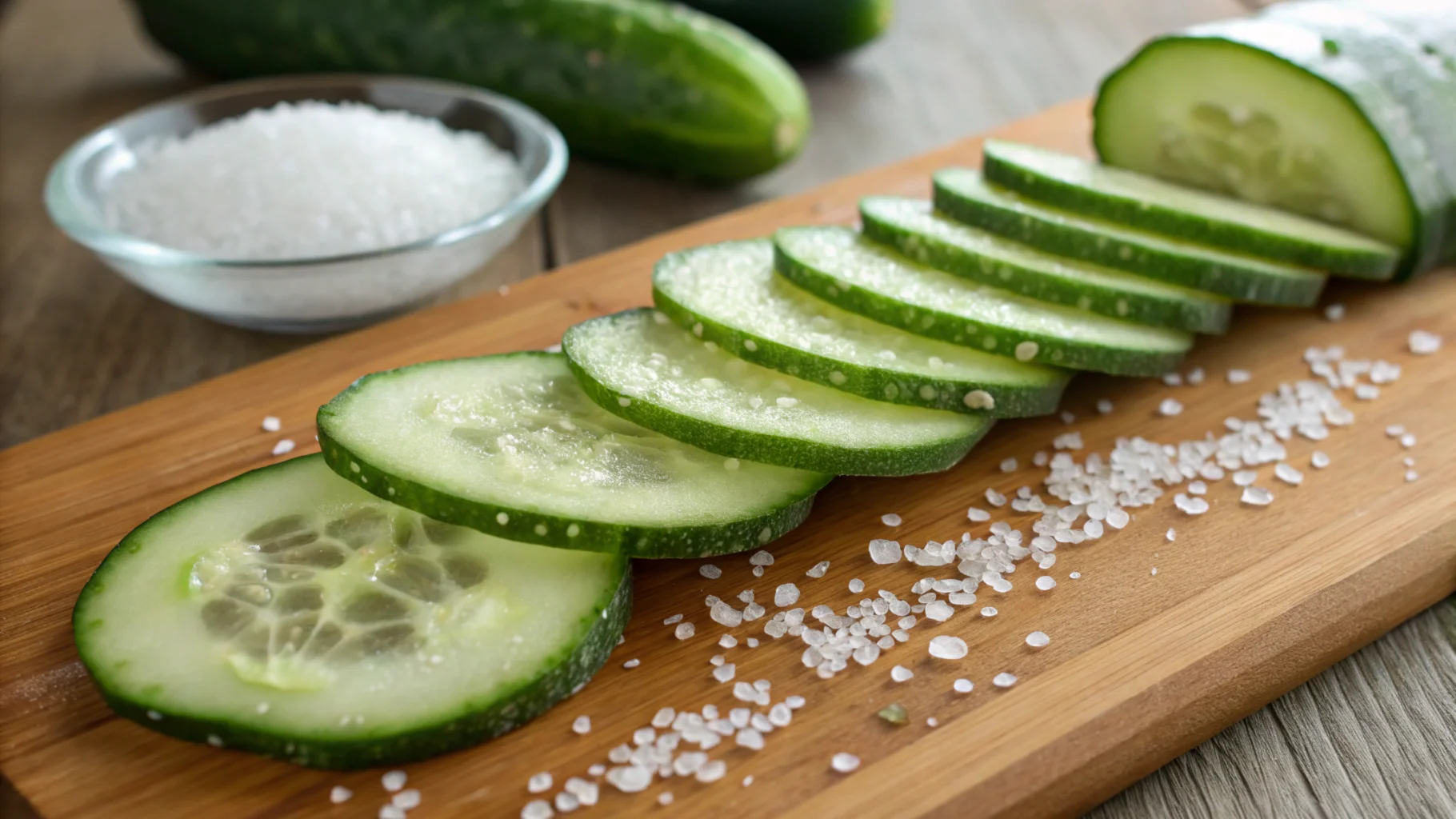Cucumber salads are a refreshing, light dish enjoyed worldwide, but did you know that soaking cucumbers in salt water beforehand can transform their flavor and texture? The process of soaking cucumbers in salt water has been a culinary secret for generations, improving their crunch, enhancing their taste, and preventing soggy salads. This article will explore why soaking cucumbers in salt water before making cucumber salad is essential, diving into the science, benefits, and step-by-step techniques for this simple yet game-changing practice.
So, let’s peel back the layers of this topic and uncover how salting cucumbers can elevate your salad game!
Table of contents
- Understanding the Science Behind Salting Cucumbers
- Benefits of Salting Cucumbers for Salads
- Step-by-Step Guide to Salt Cucumbers
- Common Mistakes to Avoid When Salting Cucumbers
- Alternative Uses for Salted Cucumbers
- The History and Culinary Tradition of Salting Cucumbers
- The Nutritional Impact of Salting Cucumbers
- Comparing Salt Water Soaking to Other Techniques
- FAQs About Salting Cucumbers

Understanding the Science Behind Salting Cucumbers
The Process of Osmosis in Cucumbers
Have you ever noticed how cucumbers release water when sprinkled with salt? This is due to osmosis, a natural process where water moves out of cucumber cells when exposed to salt. Cucumbers are made up of about 95% water, which, if left untreated, can seep into your salad, making it watery and unappealing.
When salt is applied, it pulls excess water from the cucumbers, concentrating their flavor and firming their texture. This process doesn’t just make cucumbers drier—it primes them for a delicious crunch in your cucumber salad. By reducing water content, the cucumbers are less likely to dilute your dressing or overwhelm the salad with unnecessary moisture. This is why soaking cucumbers in salt water is a simple but transformative step.
Enhancing Flavor Through Salt
Salt is often considered a flavor amplifier, and cucumbers are no exception. By removing the water content, the natural sweetness and mild tanginess of cucumbers become more pronounced. The salt also balances any bitterness in the skin or seeds, leaving behind a vibrant, fresh taste.
Interestingly, salted cucumbers are better at absorbing dressings and marinades. With less water to compete with, every bite delivers the full burst of your chosen flavors. That’s why soaking cucumbers in salt water before making cucumber salad is a crucial step for both taste and texture.
Benefits of Salting Cucumbers for Salads
Preventing Soggy Salads
One of the biggest complaints about cucumber salads is how they can quickly become watery. This happens because cucumbers naturally release moisture, especially after being cut. That’s where soaking cucumbers in salt water comes to the rescue. By drawing out this excess moisture before the cucumbers ever hit your salad bowl, you can ensure your cucumber salad stays fresh and crisp.
This process ensures your cucumber slices stay crunchy instead of limp and lifeless. Moreover, the absence of unwanted water keeps your cucumber salad vibrant for longer, even at a potluck or gathering. After all, who doesn’t prefer a salad that stays appetizing throughout the meal?
This is exactly why soaking cucumbers in salt water before making cucumber salad is a crucial step. It’s a simple trick that prevents a watery mess and ensures your salad has the perfect texture every time.
Improving Dressing Absorption
Another advantage of salting cucumbers is how it enhances their ability to soak up flavors from dressings and marinades. When cucumbers are packed with water, they tend to repel oils and creams, leaving your salad tasting bland and uneven. However, once the excess water is removed, cucumbers act like little flavor sponges, readily absorbing the deliciousness of your dressing.
Imagine biting into a cucumber salad where every slice bursts with the tang of vinaigrette or the richness of a creamy dressing. That’s the magic of this method. It’s no wonder soaking cucumbers in salt water before making cucumber salad is a time-tested technique for achieving maximum flavor.

Step-by-Step Guide to Salt Cucumbers
Preparation Techniques
To get the best results, start with fresh, firm cucumbers. Persian or English cucumbers work particularly well because they have fewer seeds and thinner skins. If you prefer traditional cucumbers, you might want to peel them first to avoid bitterness from the skin. Slice the cucumbers thinly or into bite-sized chunks, depending on your cucumber salad preference.
A good rule of thumb is to use about 1 teaspoon of salt for every cucumber. Spread the slices evenly on a flat surface, like a tray or a colander, and sprinkle the salt uniformly over them. This ensures every piece gets a little salt magic for the best cucumber salad.
Salting and Rinsing
After salting, let the cucumbers sit for about 20 to 30 minutes. During this time, you’ll notice droplets of water forming on the surface. That’s the excess moisture being drawn out. To avoid overly salty cucumbers, gently rinse them under cold water after the sitting period.
Once rinsed, pat the cucumbers dry with a clean kitchen towel or paper towels. This final step locks in the perfect texture while ensuring your cucumbers aren’t too salty. And just like that, you’re ready to create the perfect soak cucumbers, salt water cucumber salad with crisp, flavorful slices!

Common Mistakes to Avoid When Salting Cucumbers
Over-Salting and Its Consequences
While soaking cucumbers in salt water is beneficial, overdoing it can lead to problems. Adding too much salt can overpower the delicate, refreshing flavor of cucumbers, leaving your cucumber salad excessively salty. To avoid this, measure your salt carefully. Typically, one teaspoon per cucumber is enough to achieve the desired effect.
Over-salting can also affect the texture of the cucumbers, making them rubbery rather than crisp. To keep them crunchy and flavorful, stick to recommended amounts and rinse them thoroughly after salting. If you accidentally add too much salt, rinsing the cucumbers under cold water or soaking them briefly in fresh water can often save the dish.
Neglecting the Rinsing Step
Skipping the rinsing step is another common mistake when preparing salted cucumbers. Residual salt left on the cucumbers can clash with the flavors of your salad or dressing, creating an overly salty taste. To prevent this, always rinse your cucumbers thoroughly and pat them dry before adding them to your cucumber salad.
For recipes featuring additional salty ingredients, such as smoked salmon or feta cheese, this step becomes even more critical. Properly rinsed cucumbers ensure that all the flavors in your salad are balanced and complement each other harmoniously.
Alternative Uses for Salted Cucumbers
Salted Cucumbers in Tzatziki
Soaking cucumbers in salt water is not just for cucumber salad—it’s a crucial step in making creamy dips like tzatziki. By removing excess water, you ensure a thick and luscious consistency for the yogurt-based dip. Without salting, tzatziki can become watery, which weakens its bold garlic and dill flavors.
Adding salted cucumbers to tzatziki also enhances its refreshing taste, making it a perfect pairing for pita bread, grilled meats, or vegetable platters. This versatile technique elevates the dish, ensuring a satisfying bite every time.
Incorporating Salted Cucumbers into Other Recipes
Salted cucumbers can be a star ingredient in a wide range of dishes. They work beautifully in sushi rolls, adding a crisp texture and balancing the richness of the fish. You can also layer them in sandwiches for an added crunch or use them as a topping for grain bowls and wraps.
If you’re curious about creative ways to enjoy salted cucumbers, explore recipes like cucumber salads with smoked salmon, where their texture and flavor truly shine. Whether you’re crafting a classic cucumber salad or experimenting with global flavors, soaking cucumbers in salt water is a simple yet powerful technique that enhances any recipe.
The History and Culinary Tradition of Salting Cucumbers
Origins of Salting in Culinary Practices
Salting cucumbers is an age-old practice rooted in food preservation and flavor enhancement. Before refrigeration, salting was essential for extending the shelf life of fresh produce. Cucumbers, being high in water content, benefited greatly from this technique, which not only preserved them but also intensified their natural flavors.
Historically, salted cucumbers have been featured in cuisines worldwide. From pickles in Eastern Europe to relishes in America, the technique has been adapted to suit various culinary traditions. Today, this heritage underscores why soaking cucumbers in salt water before making cucumber salad is more than just a cooking tip—it’s a time-honored tradition.
Cultural Variations in Salting Cucumbers
Different cultures have unique approaches to salting cucumbers. In Greek cuisine, salted cucumbers are essential for dishes like tzatziki, while in Asian cooking, they are used as a base for pickled salads or as a garnish for sushi. Mediterranean recipes often incorporate salted cucumbers into fresh, vibrant salads that pair well with olive oil and herbs.
Even in modern Western cooking, salting cucumbers remains a staple for creating crisp, refreshing salads. This versatility showcases the universal appeal of salting cucumbers and reinforces why it’s such a widely respected technique.
For recipes featuring additional salty ingredients, such as smoked salmon, check out this Cucumber Salad with Smoked Salmon recipe, where salted cucumbers add perfect texture and flavor balance.

The Nutritional Impact of Salting Cucumbers
Does Salt Change Nutritional Value?
One common question about soaking cucumbers in salt water is whether it affects their nutritional value. Fortunately, salting cucumbers has minimal impact on their core nutrients, such as vitamins and minerals. Cucumbers remain rich in hydration and low in calories, making them a healthy choice for salads.
However, adding salt does increase the sodium content. For those monitoring their sodium intake, this might be a concern. The good news is that rinsing cucumbers after salting removes much of the added salt, keeping the final dish both flavorful and health-conscious. For most people, the benefits of enhanced flavor and texture far outweigh any small increase in sodium.
Balancing Flavor and Nutrition
For a more health-focused approach, consider using natural salts like sea salt or Himalayan pink salt, which may contain trace minerals. These options not only add depth to the flavor but also make the dish feel lighter. Pairing salted cucumbers with nutrient-dense ingredients like leafy greens, lean proteins, or whole grains can further enhance the salad’s nutritional profile.
The key is moderation. By carefully managing the salting process and rinsing thoroughly, you can enjoy all the benefits of soaking cucumbers in salt water without compromising your dietary goals.

Comparing Salt Water Soaking to Other Techniques
Alternative Methods to Remove Moisture
While soaking cucumbers in salt water is the most effective technique, other methods are worth considering. For instance, you can press cucumber slices between paper towels to remove moisture. This works in a pinch but lacks the flavor-enhancing qualities of salt.
Using sugar or vinegar is another option, particularly in pickling recipes. These methods draw out water while infusing cucumbers with sweet or tangy flavors. However, they aren’t as suitable for classic cucumber salads, where the focus is on preserving the vegetable’s natural taste.
Advantages of Salt Water Soaking
So why does soaking cucumbers in salt water remain the gold standard? First, it’s quick and easy—requiring no special tools or complex ingredients. Second, it enhances both texture and flavor, creating the perfect balance for salads, dips, and other recipes.
Unlike pressing or marinating, salting is the only method that consistently produces crisp, flavorful cucumbers without altering their essence. This is why soaking cucumbers in salt water before making cucumber salad has stood the test of time as a go-to culinary technique.
FAQs About Salting Cucumbers
How do I know if I’ve used too much salt?
If your cucumbers taste overly salty, you may have added too much salt during the soaking process. Don’t panic—rinsing them under cold water or soaking them briefly in fresh water can remove the excess salt without compromising their texture or flavor.
What happens if I skip salting cucumbers?
Skipping this step often results in watery, bland salads. Cucumbers naturally release water when cut, which can dilute dressings and make salads soggy. This is why soaking cucumbers in salt water before making cucumber salad is essential for achieving the perfect texture and flavor.
Can salted cucumbers be stored for later use?
Yes! Salted cucumbers can be stored in an airtight container in the refrigerator for up to a day. Just make sure they’re properly rinsed and patted dry to retain their crispness. Use them in salads, wraps, or as a fresh snack.
Are there any substitutes for salt in this process?
For those looking to avoid sodium, alternatives like lightly pressing cucumbers or using a splash of lemon juice can help reduce water content. However, these methods won’t replicate the flavor-enhancing properties of salt, which is why it remains the preferred choice.

